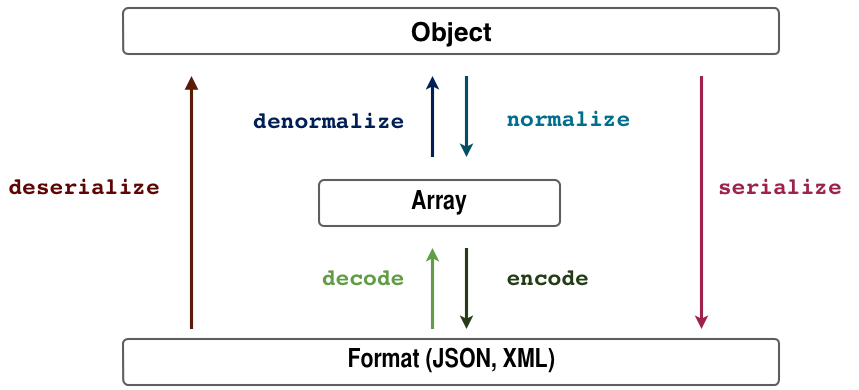On this page
Serialization API overview
Last updated on
25 July 2022
The Serialization API is new in Drupal 8. It is largely based on the Symfony Serializer component, so their documentation is also relevant.
For high-level information on what this module does, see the Serialization module documentation.

API features
Ordered by most to least frequently used APIs:
- Serializing & deserializing
- Using Drupal 8's
serializerservice's (\Symfony\Component\Serializer\SerializerInterface)serialize()anddeserialize()methods:$output = $this->serializer->serialize($entity, 'json'); $entity = $this->serializer->deserialize($output, \Drupal\node\Entity\Node::class, 'json'); - Serialization format encoding/decoding (format → array → format
- The encoder (
\Symfony\Component\Serializer\Encoder\EncoderInterface) and decoder (\Symfony\Component\Serializer\Encoder\DecoderInterface, to add support for encoding to new serialization formats (i.e. for reading data) and decoding from them (i.e. for writing data). - Normalization (array → object → array)
- The normalizer (
\Symfony\Component\Serializer\Normalizer\NormalizerInterface) and denormalizer (\Symfony\Component\Serializer\Normalizer\DenormalizerInterface), to add support for normalizing to a new normalization format. The default format is as close to a 1:1 mapping of the object data as possible, but other formats may want to omit e.g. local IDs (for example node IDs are local, UUIDs are global) or add additional metadata (such as URIs linking to related data). - Entity resolvers
- In a Drupal context, usually it will be (content) entities that end up being serialized. When given an entity to normalize (object → array) and then encode (array → format), that entity may have references to other entities. Those references may use either UUIDs (
\Drupal\serialization\EntityResolver\UuidResolver) or local IDs (\Drupal\serialization\EntityResolver\TargetIdResolver). For advanced use cases, additional mechanisms for referring to other entities may exist; in that case, you would add an additional entity resolver.
See also
Help improve this page
Page status: No known problems
You can:
You can:
- Log in, click Edit, and edit this page
- Log in, click Discuss, update the Page status value, and suggest an improvement
- Log in and create a Documentation issue with your suggestion
 Support for Drupal 7 is ending on 5 January 2025—it’s time to migrate to Drupal 10! Learn about the many benefits of Drupal 10 and find migration tools in our resource center.
Support for Drupal 7 is ending on 5 January 2025—it’s time to migrate to Drupal 10! Learn about the many benefits of Drupal 10 and find migration tools in our resource center.









